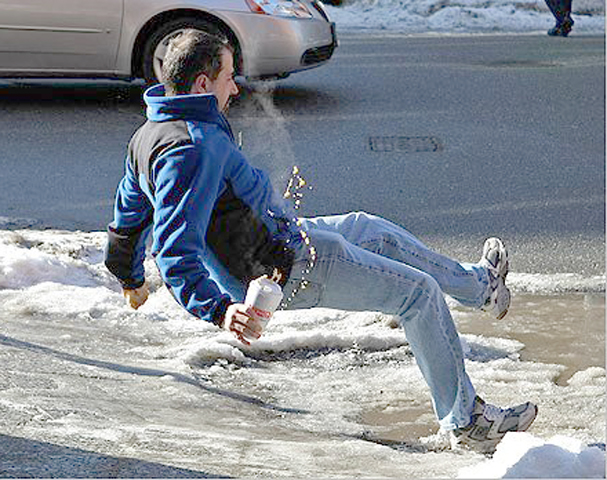Slip and Fall Accidents on Icy Surfaces

Live Help NOW  800-809-3776
800-809-3776
Snow and icy conditions bring an increased risk of slips and falls. Your rights if you do slip and fall at a public place are dependent upon things, such as the property owners’ maintenance duties, the weather, the location and your own carelessness. All of these things can affect a personal injury claim for a slip and fall accident on ice or snow.
Duty of care in ice-related slip and fall accidents
Ice-related slips and falls typically happen in parking lots or on sidewalks outside of businesses. In virtually every case, property owners have a duty to exercise reasonable care when it comes to maintaining these areas and promptly removing snow and ice to reduce the risk of falls and injuries.
Often, property owners will have contracted with plow companies that perform snow and ice removal to keep their parking lots and sidewalks clear for pedestrians. Whether it is the owner performing these maintenance and cleaning activities, or a company hired by the owner, there is a duty of care to anticipate the dangers posed by snow and ice, and to maintain the property accordingly. The question to ask is whether the property owner’s conduct was reasonable considering all of the circumstances.
Members of the public also have a duty to exercise reasonable care when walking in an area they know (or should reasonably expect) will be snowy and/or icy. Failing to do so may either reduce your recovery in a potential lawsuit or bar any recovery completely. The effect that the injured person’s own negligence has on a slip and fall case varies depending on the jurisdiction.
What can you recover?
If you slip and fall, you may be able to recover the cost of your medical bills by suing the property owner and perhaps even the contractor who was responsible for clearing away snow and ice. You could also recover lost wages if you can demonstrate that your injury (and perhaps doctor’s appointments associated with it) caused you to miss work —or to work less during your medical treatment than you otherwise would. In addition, you may be able to recover for the pain and suffering that the injury caused you. In addition to the pain of the injury itself, you can also recover for the negative impact on your regular activities, such as exercise, chores, or leisure pursuits like playing on a sports team. All of these effects are components of your damages.
Documenting your case
Because weather conditions change frequently, it is important to document as much about the area where you fell as possible. If you can, take photos or send someone to take photos of the area as it looked around the time of the accident. Snow and ice are typically cleared on a regular schedule, so you want to make sure that you can give your attorney an idea of how the area looked when you were injured. Be sure you to write everything down after the accident and talk to accident witnesses to help your case.
Government liability for a slip and fall
If your fall occurred on government property (such as a county parking lot or city sidewalk), there are special rules that might affect your case. Governmental immunity may affect your ability to bring a lawsuit or your ability to recover even if you can sue. In most cases, you’ll need to jump through some administrative hoops by filing a notice of your injury with the government agency that might bear liability, and you’ll need to get this claim filed pretty soon after the slip and fall accident.
Helpful Links:
Indianapolis injury lawyer
Workers compensation lawyer lafayette
Columbus injury lawyer
Anderson workers compensation attorneys
Workers compensation lawyers
Indiana workers compensation lawyer
Lebanon workers compensation lawyer
Louisville workers compensation lawyer
Greenfield workers compensation attorneys
Lawyers near me
Indianapolis workers compensation attorney
Workers compensation lawyers
Workers comp attorneys bend
Harmony car accident attorney

